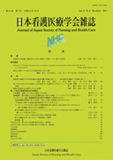Japanese
English
- 有料閲覧
- Abstract 文献概要
- 参考文献 Reference
要旨
本研究は水道水・人工浴用剤水・温泉水への入浴による、保温効果と気分への影響の違いを明らかにし、看護の中での人工浴用剤の活用の基礎資料とすることを目的とした。対象者は、20歳代男性12名で慢性疾患及び心疾患や高血圧等の循環器疾患、皮膚疾患のない者とした。対象者は、実験の説明を受けた後で、3条件の異なる水質への入浴を行った。実験は、10分間の安静座位の後で、38℃に設定した湯に30分間入り、入浴終了後に再度、30分間の安静座位を行った。調査内容は、保温効果指標として深部体温(腋窩温)、末梢体温(右中指温)、気分の指標として、日本語版POMS、唾液中コルチゾールの測定を行なった。保温効果指標の深部体温では、[温泉水]への入浴では温熱作用が緩やかに伝わることが明らかになった。また、末梢体温では[浴用剤水]への入浴で末梢体温の保温状態が持続することが明らかになった。気分の指標は、日本語版POMSは3条件共に入浴前と比べ入浴後に『抑鬱─落ち込み』『怒り─敵意』『混乱』の気分が低下し、『活気』が高まった。しかし[温泉水]では『疲労』も入浴前と比べ入浴後に高まった。このことから[温泉水]の入浴は、精神的な活力を増すが、疲労感も増強させる可能性が示唆された。唾液中コルチゾールは、3条件共に、入浴前安静終了時と比べ、入浴終了時では減少したが、入浴後安静終了時は3条件ともに唾液中コルチゾールは増加し、中でも[水道水]への入浴で最も増加した。この結果から入浴開始後は気分が「快」であったが、入浴時間の長さがストレスになり唾液中コルチゾールが増加したと考える。本研究においては[浴用剤水]の入浴において、入浴中の末梢保温状態が入浴後も持続した。また3条件共に入浴によって気分が「快」になることが明らかになった。
Abstract
This study aimed to clarify the effects of warm water bathing on skin temperature and mood state, and to compare the effects of three different water types: tap water, water with additives, and natural spring water. The study design was approved by the Ethical Review Committee of the Department of Medical Sciences, University of Fukui. Inclusion criteria for this study were male, age between 20 to 29 year, and no history of circulatory diseases, chronic diseases, and dermatological diseases. Subjects were asked to perform the following bathing procedure in each of the 3 kinds of water: 1)10 min of rest on a chair(1st rest); 2)30 min of warm water(38℃) bathing(bathing); and 3)30 min of rest on a chair(2nd rest). The subjects' kinetic temperatures(axilla and middle finger)were observed during these procedures. Secretory cortisol levels were measured in the subjects' saliva. Subjects' objective moods were measured by using the Profile of Mood States(POMS). Kinetic temperatures increased during bathing and gradually decreased after bathing under all conditions. From analysis of POMS, "Tension-Anxiety", "Anger-Hostile" and "Confusion" moods decreased in all three conditions; whereas, "Vigor" mood increased after bathing in all conditions. In addition, increased "Confortable" mood was observed after bathing in all three conditions. The salivary cortisol level was decreased immediately after bathing in all 3 types of water, but increased at the end of 30 minutes bathing, especially in the tap water bathing. This result indicates that stress level decreased at the beginning of bathing, but increased toward the end of bathing. In conclusion, bathing in any condition could make relaxation, but the bathing in natural springs could have the most relaxation effect on the subjects. In addition, bathing in water with additives had an insulating effect and caused the longest elevation of skin temperature.
Copyright © 2011, Japan Society of Nursing and Health Care All rights reserved.


